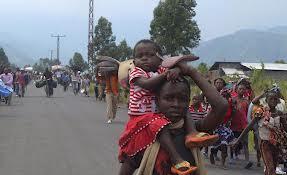
Congolese populations fleeing fighting in Goma area.
The Rwandan Patriotic Front [RPF] invaded Rwanda on October 1st 1990. By 1992, Paul Kagame’s rebellion fully supported by Joweri Museveni occupied a fraction of the Rwandan territory bordering Uganda. RPF rebels managed to put military pressure on Habyarimana’s government for their grievances, as M23 is doing with the Congolese authorities.
One major mistake that different Rwandan political parties MDR, PSD and PL then opposed to the president made was that they thought that by siding with RPF politically, they could speed up the removal of Juvenal Habyarimana and gain power and share it with the rebels. They put aside their democratic values they had been brandishing against the Rwandan president and supported an armed rebellion which were causing misery to hundreds of thousands of Rwandan citizens particularly from rural areas.
They were wrong in supporting RPF in its armed struggle because they lost on all the fronts: 1) they didn’t save the nation by refusing to unite with all the forces which were against the invaders, but ready if necessary to listen to their grievances though not giving them too much; 2) they facilitated the task to RPF in gaining internal support and momentum to achieve its political objectives; 3) they were immediately sidelined by Paul Kagame’s RPF once he took power in Kigali on July 4th, 1994. Congolese should learn here what happened to those who accepted to sit and negotiate with RPF at the time.
In the case of DRC, the roles are inverted contrary to what prevailed in Rwanda of 1992. The Congolese opposition appears more patriotic ready to defend interests of the country than the presidential camp of Joseph Kabila which thinks wrongly that by responding favorably to Joweri Museveni, Paul Kagame and M23 for negotiations with the latter they might save DRC from balkanisation. By giving in, Joseph Kabila has shown again his weakness and lack of sacrifice for DRC and those interested in the two Kivus will be playing on that Achilles’ heel once more.
A negotiation meeting started this week in Kampala between M23 and Kabila’s government that the latter has been forced into. The meeting is being held under the leadership of Joweri Museveni. And the camp working for the partition of DRC has the upper hand, having seriously tested how weak DRC institutions are by managing to capture, occupy and “leave” Goma on their terms, and forcing Congolese into negotiations. It is only a matter of time before they finalise their plans of taking the two Kivus provinces. And this won’t be long.
What are the options available to Congolese people?
- Charles Onana, while launching his recent book “Europe, Crimes et Censure au Congo” on November 29th, 2012, strongly invited Congolese to mobilise, mobilise and mobilise for their country; nobody will defend it better than themselves
- As this was to be for Rwandan political parties which wrongly saw in Kagame’s RPF a better future for their country; Congolese politicians who see in negotiating with M23 a peaceful solution of DRC crisis they are fooling themselves. The Congolese nation needs to wake up and stand firm to the devilish ambitions of Paul Kagame and Joweri Museveni over their country. They need to read closely the Rwandan pre-genocide period and their own experience with the two leaders since 1996. If they cannot get any lesson out of such telling case studies, they are as culprits as M23 and its sponsors in the face of the Congolese population.
- For the last 16 years, Eastern Congo [North and South Kivu provinces] has presumably benefited Rwanda significantly. In a recent interview with Aljezeera, Ambassador Cohen sarcastically said the Kivus belonged economically to Rwanda. If Congolese want to prove wrong anyone who think like that personality, and there are plenty who would want to see DRC falling into pieces for them to collect easily, they have to be ready to make a lot of sacrifices and keep their nation together as one.
- While Paul Kagame has been weakened by the revelations of his involvement with M23 by the UN Group of Experts reports, he is not finished since despite his star fading, he has managed to get Kabila government agreeing to negotiate with M23. And this was his primary objective. Like in previous scenarios of occupying parts of DRC, he expects to keep hold of his preferred Kivus. In order not to continue experiencing this humiliating imposed situation, DRC popular patriotic forces need to force Joseph Kabila and all his political allies to resign even by a public uprising and outrage for him selling out to the enemies of the Congolese nation.
However, for this final option, patriotic Congolese will have to be very vigilant as according to the political analyst Jean-Pierre Mbelu M23 has many ramifications in Congolese administrative structures.
“M23 is everywhere in Congo, because M23 is CNDP whose members are found today in Goma, Kananga, Lubumbashi, Kitona, even in Kinshasa. They are everywhere. M23 is a full member of the Alliance for the Presidential Majority. Ties they forged were never officially broken.”
